this post was submitted on 07 Oct 2023
209 points (91.3% liked)
solarpunk memes
4492 readers
66 users here now
For when you need a laugh!
The definition of a "meme" here is intentionally pretty loose. Images, screenshots, and the like are welcome!
But, keep it lighthearted and/or within our server's ideals.
Posts and comments that are hateful, trolling, inciting, and/or overly negative will be removed at the moderators' discretion.
Please follow all slrpnk.net rules and community guidelines
Have fun!
founded 3 years ago
MODERATORS
you are viewing a single comment's thread
view the rest of the comments
view the rest of the comments

When we replace all of the gas ranges in homes, restaurants, etc with electric ones, that creates a reduction in demand. How does someone renting a house with a gas furnace, a gas hot water heater, and a gas range reduce their demand for gas? Just eat less and don’t shower or use heat? It’s absurd to expect individuals to equally share the burden when they don’t equally contribute, nor have equal means available to them.
How does someone making $18,000/year afford to buy an electric car to stop using gasoline, and even if they do, how does that help with tire pollution, which is more than an order of magnitude higher than tailpipe pollution on most modern cars? What products can I buy that are completely void of any unnecessary use of plastic? Which ones that exist aren’t priced higher due to petroleum subsidiaries ensuring they remain the cheapest option for manufacturers to use to package their products?
How does someone living in Compton living a completely sustainable life change Bill Gates flying around in a jet and creating monoculture farms that each do more harm to the environment than the average person? Why is the onus on the average man, when it has been shown repeatedly that the average person uses entire orders of magnitude less than those in upper echelons of society? When people like Kylie Jenner use the equivalent of 40,000 people worth of resources in a week, why wouldn’t we start by leveling the playing field, and ensuring first that some aren’t abusing their privilege while others have not even enough?
the same way they keep buying larger and larger gas trucks and SUV's currently. We are so damn far from your notion that people are doing what they can and just dont have the means to do more. We agree on a lot of stuff, like the importance of public transit and less car-centric city design, but we dont have it because most Americans dont want it. They want more roads and bigger vehicles and cheaper gas.
In fact Im kind of losing motivation to push this, consumer responsibility would be the smoothest way, but I dont have any faith in the US population to even consider doing anything.
You really think the people living on $18,000 are buying $110,000 trucks and $80,000 SUVs? I think you have a warped perspective on the average working class person, and what they have. Look up what the average age of vehicle in service in the US is. Look up the ratio of New: Used cars. The poor aren’t buying new cars, whether that be a Corolla or a F150.
I know they have an insane amount of debt. Also 18k isnt the average, and they dont have to be buying new. US vehicles are becoming increasingly large and theyre not just...spawning out of nothing, people are buying them.
So almost exclusively wealthy people buy new cars, and thus set the trends for desirable features and sizes for manufacturers to make. The rest of the population is forced to play cleanup on the refuse of the wealthy and buy their leftover thrown away vehicles used. Where exactly do regular people have the ability to influence anything there? You could say, buy a smaller car, but they’re already not buying cars at all if they’re really poor, and if they’re moderately poor to even lower middle class, then they’re buying used cars. Neither of those put a single dollar in the pockets of manufacturers, meaning neither of those has ANY influence whatsoever on manufacturers and what they build.
That’s before we get into ways that regulation has made it cheaper, and more profitable, for manufacturers to increase the sizes of their vehicles.
It’s pretty clear you have no theoretical framework or grasp of the systems in place in the US or how they function. I Can recommend some readings if you like, but there is a knowledge gap that you will need to bridge if you hope to ever have meaningful discussions around economics and political economy. Not even the neoliberal economists who implemented “personal responsibility” optics believe in them, as evidenced by their actions and academic works.